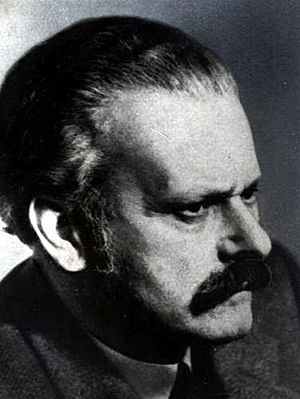Erwin Guido Kolbenheyer facts for kids
Quick facts for kids
Erwin Guido Kolbenheyer
|
|
|---|---|
 |
Erwin Guido Kolbenheyer (born December 30, 1878, in Budapest – died April 12, 1962, in Munich) was an Austrian writer. He wrote novels, poems, and plays. Later, he lived in Germany and was part of a group of writers who were liked by the Nazis. Some of these writers included Hans Grimm and Agnes Miegel.
About His Early Life
Erwin Kolbenheyer was from a German-speaking family living in Hungary, which was part of the Austro-Hungarian Empire at the time. He went to school in Budapest, then continued his studies in Karlsbad and Vienna. He studied philosophy, psychology, and zoology at the University of Vienna. He earned his PhD degree in 1905.
After his studies, he became a writer. He focused on historical novels that often explored German themes. In 1908, he published a novel called Amor Dei. This book was about the life and ideas of the Jewish-Dutch philosopher Baruch Spinoza. This book helped Kolbenheyer become quite well-known.
In 1922, he published a collection of his own poems called Der Dornbusch brennt (which means Burning bush). Between 1917 and 1925, he wrote his most famous works. These were three novels about a historical figure named Paracelsus. In these books, Kolbenheyer explored ideas popular at the time. He showed his hero as a strong, ideal German person fighting against bad influences.
In 1929, he published a play called Heroische Leidenschaften (meaning Heroic Passions). This play was about the Italian astronomer Giordano Bruno. Kolbenheyer lived among the Sudeten Germans, and his right-wing political views became stronger. He started to express ideas that were similar to Nazism. For example, in his 1925 book Die Bauhütte, he suggested that German people should move away from 'Judeo-Christianity' for their well-being. This book is thought to have influenced Alfred Rosenberg's famous Nazi book, The Myth of the Twentieth Century. Kolbenheyer himself said his book Bauhütte was meant to awaken the "philosophical conscience ... of the white race."
He strongly disagreed with left-wing politics. In 1931, he resigned from the Akademie der Künste (Academy of Arts). He felt they supported writers like Heinrich Mann and Alfred Döblin, whose views he opposed.
During the Nazi Era
Erwin Kolbenheyer continued to write a lot when the Nazis were in power. He wrote a poem praising Adolf Hitler. He also defended the Nazi book burnings, where books considered "un-German" were destroyed. He wrote novels that supported the Nazi war efforts, such as Karlsbader Novellen 1786 (1935) and Das Gottgelobte Herz (1938). Das Gottgelobte Herz (meaning The God-blessed heart) was a novel about the Dominican nun Margareta Ebner.
Kolbenheyer became very popular under the Nazis. This was because his writing fit their world view or way of thinking. After the Nazis came to power in 1933, he was one of several writers added to the Prussian Academy of Arts. Other writers, like Franz Werfel and Jakob Wassermann, who did not share Nazi ideas, were removed.
In 1934, his play Gregor und Heinrich was performed. It was about Henry IV, Holy Roman Emperor and Pope Gregory VII. This play also showed his support for the Nazis, as he dedicated it to "the German spirit in the process of being resurrected." As a reward for his high standing with the Nazis, he was put on 'List A', also known as the 'List of the God-gifted' or the Gottbegnadeten list. This meant he was excused from military service because he was considered so important. He also received the Goethe Prize in 1937. In 1940, he published a collection of writings called Vox humana and became a member of the Nazi party.
After the War
After the Second World War, Erwin Kolbenheyer was not allowed to publish books for five years. However, from his home in West Germany, he continued to write novels. These books often had the same nationalist ideas as his earlier works. He also regularly wrote for Nation Europa, a journal that supported far right, pan-European nationalist ideas.
Quotation
From Kolbenheyer's play Menschen und Götter (meaning Men and Gods), published in Prague in 1944:
- SON OF MAN
- Go further monk, and heal
- your excessive pain through my pain.
- It flows to you as a part of yourself
- out of the infiniteness.
- Lo, the drops descend,
- drops of blood out of heart and hand.
- You shall humbly drink
- the salvation by sacrifice, sent by God.
See also
 In Spanish: Erwin Guido Kolbenheyer para niños
In Spanish: Erwin Guido Kolbenheyer para niños
 | Delilah Pierce |
 | Gordon Parks |
 | Augusta Savage |
 | Charles Ethan Porter |

